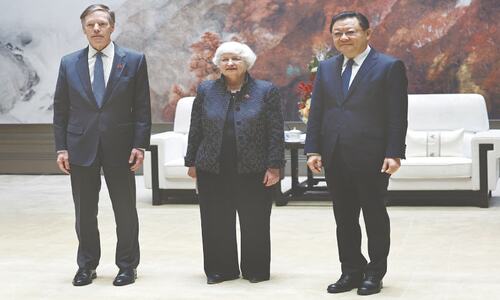GUANGZHOU: US Treasury Secretary Janet Yellen stated on Friday that worries about the effects China’s surplus manufacturing capacity will have on the world economy are becoming more pressing, and this will be the main topic of discussion during four days of economic meetings with Chinese officials.
Speaking to an audience of around 40 members of the American Chamber of Commerce in Guangzhou, Yellen stated that China is too big to export its way to rapid growth and that it would gain from lowering surplus industrial capacity that is straining other countries.
At a meeting with Vice Premier He Lifeng and Governor Wang Weizhong of Guangdong Province in Guangzhou, China’s southern export hub, Yellen stated, “Overcapacity isn’t a new problem, but it has intensified, and we’re seeing emerging risks in new sectors.”
In light of a decline in demand in China’s domestic market, Yellen and other Biden administration officials are becoming more and more concerned about China’s excess production of solar panels, electronics, electric cars, and other products that are flooding international markets.
She urged Beijing to abandon state-driven investment and go back to the market-oriented changes that supported growth in previous decades, arguing that this is bad for China and hurting manufacturers in other nations.
Financial collaboration
Yellen emphasized areas of shared interest in a discourse started during her first visit to China in July, including combating climate change and illicit finance, even as Sino-US tensions over a variety of topics have been rising.
According to her, efforts have been made by a financial working group with representatives from both parties to limit the financial risks associated with a possible bank failure in either economy.
Without going into further information about the review’s conclusions, Yellen stated, “We’ve held technical exchanges between our sides, including an exercise on how we would jointly deal with the failure of a large bank in the US or in China.”
China has set a lofty five percent economic growth target for 2024, which will be aided by more investment in emerging high-tech industries as the country works to recover from a real estate bubble bust and low consumer demand. To increase domestic consumption and lessen its long-standing strong reliance on investment, many economists contend that China’s economic model needs to be significantly revised.
Yellen began her meeting with He on Friday by stating that the two nations needed to talk closely about challenging challenges such overcapacity and economic constraints linked to national security.
She stated, “It is what the people of the world and our citizens expect from us.”
Tariff preparatory work
Some trade analysts believe that the US’s growing criticism of China’s production-oriented, debt-driven, and subsidy-driven economic model is a first step toward the US imposing higher tariffs on Chinese electric vehicles and clean energy products in order to defend US industry.
While Yellen has refrained from threatening to impose additional trade barriers, she did state during her visit to Guangzhou that further steps to guard against low-cost Chinese imports of EVs, batteries, solar power, and other items will not be ruled out.
Although US officials think it was critical to highlight the risks that China’s economy and its trading partners face from overinvestment in certain industries and relatively low consumer demand in China, the Treasury does not anticipate a significant change in Chinese policy as a result of Yellen’s visit.
Establishing a relationship between the US and China that could “withstand shocks and challenging circumstances” was one of Yellen’s goals for the trip, she stated on Friday. Apart from the issue of overcapacity factories, Yellen expressed her concern about the worsening business environment in China for foreign enterprises. She cited a poll conducted by AmCham, which revealed that one-third of American companies operating in China reported experiencing unfair treatment in comparison to their local competitors.
She stated that stopping such activities would be advantageous for China and that they included “imposing barriers to access for foreign firms and taking coercive action against American companies.”
State media in China pushes back
Yellen’s warning on excess capacity has been met with resistance from Chinese official media, which claims it represents a double standard.
As home demand is satisfied, surplus products naturally look for markets overseas. Western countries have been doing this for ages, but when it comes to China, this becomes a “overcapacity problem” that threatens the entire world, according to the China Daily.
Following a meeting between representatives of the Chinese Commerce Ministry and the US Commerce Department in Washington on Thursday, Yellen will hold more consultations in Beijing on Saturday and Monday.








